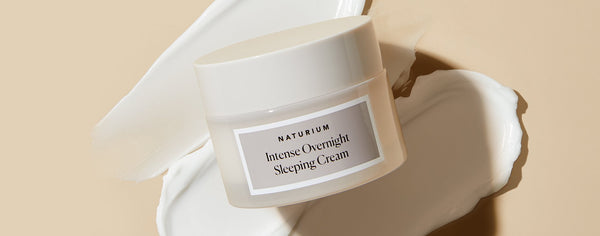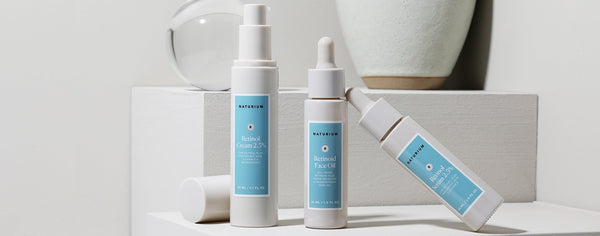Vitamin C: The Powerhouse Antioxidant

Chances are, you’ve already heard about vitamin C and are likely incorporating it into your skincare routine, already. The powerful antioxidant is known for its brightening properties, but not all vitamin C is created equally. Read on and let us tell you all about vitamin C and its amazing skin benefits.
Vitamin C is one of the most well known and studied skincare actives, containing a plethora of skin benefits. Topical application of vitamin C helps protect skin from UVA and UVB damage, increases skin elasticity and strength, decreases hyperpigmentation, speeds wound healing, reduces inflammation, and can improve skin barrier function.
Vitamin C and its Derivatives
L-ascorbic acid is the most biologically active form of vitamin C, but it poses formulation challenges. For it to exert a physiological effect or be efficacious, ascorbic acid needs to penetrate the stratum corneum, which is only possible when it is in its uncharged form. Traditional skincare formulas containing free ascorbic acid are formulated at pH 3.5 or below for optimal stability and permeability, which can be irritating. Ascorbic acid is also unstable in the presence of air and light, requiring UV protected packaging and limited air exposure. There are a number of vitamin C derivatives on the market that have greater oxidative stability and do not need to be formulated at a low pH; however, they vary in efficacy. In order for a derivative to have a physiological effect, it must penetrate the stratum corneum and then be converted in vivo to ascorbic acid.1 Selecting the right form of vitamin C for a product depends on the format of the product (oil soluble vs water soluble), final product pH, other ingredients in the product, and the ability of the derivative to convert to ascorbic acid in vivo.
The Powerhouse Antioxidant
Ascorbic acid is the most abundant antioxidant found in the skin. The conjugate base, or negatively charged form of ascorbic acid, is resonance stabilized and able to donate electrons easier, making it a great antioxidant. Oxidative damage is the result of free radicals, which take electrons from surrounding cells, thus making those cells less stable and more reactive. It creates a cascading effect, damaging cells as electrons are stolen. Oxidative damage is caused by pollution, UV exposure, smoking, and other external stressors and can lead to inflammation, erythema, premature skin aging, and hyperpigmentation. Antioxidants, such as vitamin C, are good electron donors and quench these free radicals by sacrificing an electron while their oxidized species are relatively nonreactive. Vitamin C also plays a significant role in recycling vitamin E within the skin. Vitamin E is another important antioxidant that protects cell membranes and lipids from oxidative stress. Similar to vitamin C, UV exposure depletes vitamin E within the skin. Vitamin C actively recycles vitamin E thus “reactivating” this important antioxidant.2
The Photoprotective Antioxidant
As we age, collagen synthesis naturally decreases, but UV exposure can expedite the depletion of collagen in skin. Photoaging or, cumulative oxidative damage from UV exposure, significantly decreases collagen production due to Matrix Metalloproteinases (MMPs) induced by reactive oxygen species (ROS). Vitamin C neutralizes these ROS to minimize collagen degradation. For this reason, vitamin C products are great to layer below sunscreens. Vitamin C pairs well with sunscreen use to further aid in UV protection and reduce photoaging.3 It can be used both day and night, especially benefiting the skin after UV exposure. UV exposure decreases the vitamin C concentration in skin and topical application can replenish depleted levels. Vitamin C helps to both prevent and repair photoaging, improves fine wrinkling, skin roughness, loss of elasticity, and sallowness.4
Vitamin C helps to both prevent and repair photoaging, improves fine wrinkling, skin roughness, loss of elasticity, and sallowness.
Helps Boost Collagen
Collagen is the main structural protein found in the dermis that provides the skin with strength and elasticity. Vitamin C is crucial for collagen synthesis and stability. It is a cofactor for enzymes responsible for creating stable collagen molecules as well as crosslinking the collagen to improve strength. It also signals collagen genes to begin collagen production necessary for wound healing.5 Applying Vitamin C topically increases collagen production in both aged and young skin.
Brightens Skin
Ascorbic acid is a skin brightener that reduces sallowness and brightens dark spots. The mechanism of melanogenesis reduction by ascorbic acid is not fully understood. One study proposed ascorbic acid reduces melanin formation by reducing dopaquinone, a precursor to melanin, while other studies propose ascorbic acid suppresses tyrosinase either by binding to the copper ions attached to tyrosinase or by acidifying the cytoplasmic environment.6,7
Helps Protects the Skin Barrier
Cell culture studies show vitamin C can enhance barrier function by increasing production of crucial barrier lipids such as ceramides.8 Strengthening the skin barrier minimizes skin dehydration and maintains moisture content within the skin.
Fights Inflammation
Vitamin C inhibits pro-inflammatory cytokines and prevents post-inflammatory hyperpigmentation.9 Vitamin C has even been used before and after laser resurfacing to prevent erythema.10 Coupled with its wound healing properties, vitamin C is a great skincare ingredient to use post cosmetic procedures.
The Naturium Difference
As noted earlier, ascorbic acid is prone to oxidation and requires special formulation conditions such as low pH to be effective. To overcome these challenges, Naturium’s Vitamin C Super Serum Plus and Vitamin C Complex Serum utilize a special delivery system to protect the L-ascorbic acid from oxidative degradation while enhancing penetration at a broader pH range. We also included glutathione, another antioxidant that works within the skin to “reactivate” vitamin C, once it has been oxidized. In other formulas we use potent vitamin C derivatives including tetrahexyldecyl ascorbate, 3-O-ethyl-l-ascorbic acid, and sodium ascorbyl phosphate to enhance skin brightening, provide antioxidant protection, and improve skin elasticity.

SOURCES:
- 1https://www.mdpi.com/2072-6643/9/8/866/htm
- 2https://www.ncbi.nlm.nih.gov/pmc/articles/PMC5605218/
- 3https://academic.oup.com/asj/article/18/6/468/277337
- ...
- 4ttps://pubmed.ncbi.nlm.nih.gov/12823436/
- 5https://www.ncbi.nlm.nih.gov/pmc/articles/PMC3673383/
- 6https://www.researchgate.net/publication/14983513_Effect_of_L-ascorbic_acid_on_the_monophelase_activity_of_tyrosinase
- 7https://www.researchgate.net/publication/263014823_In_Silico_Approach_to_Inhibition_of_Tyrosinase_by_Ascorbic_Acid_Using_Molecular_Docking_Simulations
- 8https://www.ncbi.nlm.nih.gov/pmc/articles/PMC4624068/#:~:text=Our%20qPCR%20and%20western%20blot,is%20stimulated%20by%20Vit%20C
- 9https://www.ncbi.nlm.nih.gov/pmc/articles/PMC3673383/
- 10Alster T West TB. Effect of topical vitamin C on postoperative CO2 laser resurfacing erythema. Dermatol Surg 1998;24:331–334.





